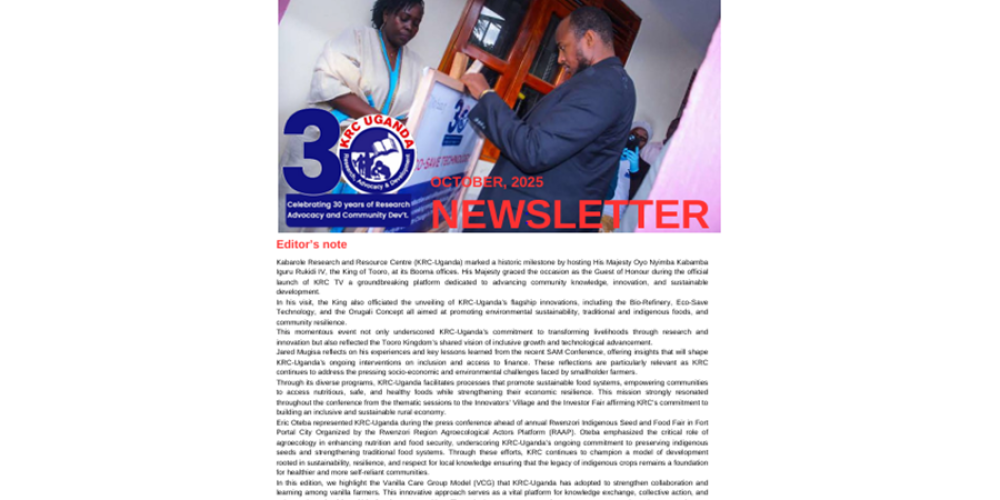Kabarole Research and Resource Centre (KRC-Uganda) marked a historic milestone by hosting His Majesty Oyo Nyimba Kabamba Iguru Rukidi IV, the King of Tooro, at its Booma offices. His Majesty graced the occasion as the Guest of Honour during the official launch of KRC TV a groundbreaking platform dedicated to advancing community knowledge, innovation, and sustainable development. In his visit, the King also officiated the unveiling of KRC-Uganda’s flagship innovations, including the Bio-Refinery, Eco-Save Technology, and the Orugali Concept all aimed at promoting environmental sustainability, traditional and indigenous foods, and community resilience. This momentous event not only underscored KRC-Uganda’s commitment to transforming livelihoods through research and innovation but also reflected the Tooro Kingdom’s shared vision of inclusive growth and technological advancement.
Jared Mugisa reflects on his experiences and key lessons learned from the recent SAM Conference, offering insights that will shape KRC-Uganda’s ongoing interventions on inclusion and access to finance. These reflections are particularly relevant as KRC continues to address the pressing socio-economic and environmental challenges faced by smallholder farmers. Through its diverse programs, KRC-Uganda facilitates processes that promote sustainable food systems, empowering communities to access nutritious, safe, and healthy foods while strengthening their economic resilience. This mission strongly resonated throughout the conference from the thematic sessions to the Innovators’ Village and the Investor Fair affirming KRC’s commitment to building an inclusive and sustainable rural economy.
Eric Oteba represented KRC-Uganda during the press conference ahead of annual Rwenzori Indigenous Seed and Food Fair in FortPortal City Organized by the Rwenzori Region Agroecological Actors Platform (RAAP). Oteba emphasized the critical role of agroecology in enhancing nutrition and food security, underscoring KRC-Uganda’s ongoing commitment to preserving indigenous seeds and strengthening traditional food systems. Through these efforts, KRC continues to champion a model of development rooted in sustainability, resilience, and respect for local knowledge ensuring that the legacy of indigenous crops remains a foundation for healthier and more self-reliant communities.
In this edition, we highlight the Vanilla Care Group Model (VCG) that KRC-Uganda has adopted to strengthen collaboration and learning among vanilla farmers. This innovative approach serves as a vital platform for knowledge exchange, collective action, and enhanced productivity within farming communities. Through these care groups, farmers are empowered to share experiences, access training opportunities, and adopt practical innovations that improve both the quality and quantity of their vanilla yields. By fostering peer learning and community-driven solutions, the model not only boosts livelihoods but also promotes sustainable and resilient agricultural practices across the Rwenzori region


